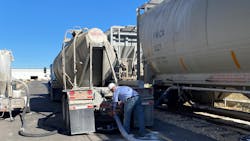Congress votes to block rail strike that would halt chemical, fuel shipments
Congress this week approved legislation to block a rail strike that could hamper freight capacity nationwide, impacting not only the economically vital holiday season, but the trucking industry, which would have to carry some of rail’s lost volume. The House voted to avert the strike Wednesday, and the Senate wasted little time following suit Thursday.
Now the chemical and trucking industries are hoping the bill quickly becomes law.
After passing in the House 290-137, and 80-15 in the Senate, it only needs a signature from President Biden, who asked Congress to halt the potential strike earlier this week.
“Chemical manufacturers are one of the first industries that will be impacted as railroads start restricting service up to a week before a threatened strike,” Chris Jahn, American Chemistry Council president and CEO, said in a Nov. 28 release. “Freight rail transportation is vital for transporting chemicals critical to everyday life, including water treatment, energy production and food production. Shutting down chemical shipments by rail would quickly send shockwaves that would be felt through the entire economy and households across the country.”
American Trucking Associations deemed a strike by rail works as potentially “crippling” to the U.S. economy. With a Dec. 9 strike deadline set, railroads are planning to stop taking hazardous materials, including fuel, next week. With national fuel supplies, especially diesel, in short supply throughout numerous parts of the country, the U.S. “cannot afford any disruption to our nation’s supply chain that a potential rail strike would create,” ATA said in a release.
“Further delays only result in more uncertainty and inflationary pressure at a time when the economy is straining under the weight of both,” said Chris Spear, ATA president and CEO.
National Tank Truck Carriers also urged “swift approval of this legislation by both the Senate and President of the United States” in a statement posted on its website.
“Transportation is a balanced and interdependent ecosystem,” said Ryan Streblow, NTTC president and CEO. “Think of the supply chain like a balloon—if pressure is squeezed on one end, the other end must expand to make up for it. The American rail and tank truck industries successfully transport bulk commodities like fuels and chemicals in tandem. When one segment is affected the other must fill the gap. In this case, if our rail system ceases operations, there are not enough tank trucks to fill a gap like that.
Added Randy Clifford, NTTC chairman: “The tank truck industry has many challenges today, with a driver shortage being chief among them. Exacerbated by COVID-19 lockdowns, our industry is short tens of thousands of drivers to meet today’s demand—even before a railroad strike.
“If our rail system shuts down, we just don’t have enough drivers to replace fuel and other deliveries that the American public depend on.”
Tentative agreement
The latest rail predicament comes after four of the 12 freight rail unions voted against a tentative agreement brokered by the Biden administration. If the bill is signed into law, it would impose the terms of September’s tentative agreement upon rail workers. That agreement would raise wages, but many union members who voted on it did not believe it offered enough paid sick leave, according to a statement from rail union Brotherhood of Maintenance of Way Employes Division.
As a response from Democratic lawmakers that characterize the bill as anti-labor, House Speaker Nancy Pelosi responded by adding a second vote Nov. 30 that would add seven days of paid sick leave per year for rail workers covered under the agreement. The House passed that bill 221-207.
The bill guaranteeing extra sick days would take effect only if the Senate passes both measures, according to The Associated Press. The Senate is expected to vote on both bills next week, before the Dec. 9 strike date.
When asked whether Senate Republicans would support blocking the rail strike, Senate Minority Leader Mitch McConnell told the media, “I think some may be inclined to vote against it, and others are arguing that the economic price of doing that is too great.”
Sensitive shipments
To prepare for a shutdown, railroads stop accepting “security sensitive shipments,” including certain chemicals, well in advance of a strike, ACC said. Many chemical facilities would be forced to curtail production or shut down within the first week of a rail service embargo.
According to an economic analysis conducted by ACC, the impact of a potential strike would be felt almost immediately in terms of business shutdowns, scarcity of materials and goods, and lost economic activity. According to the analysis, a strike lasting one month would likely put a major chill on several leading economic indicators through the first half of 2023:
- Job loss: The U.S. economy would lose 700,000 jobs across multiple industries and economic sectors. These losses would essentially erase the job gains made over the past three months.
- Inflation spike: The Producer Price Index (PPI) would jump by four percent. PPI measures inflation from the viewpoint of industry and is considered a leading indicator for consumer inflation. A four percent spike would represent a twentyfold increase over the latest PPI reading.
- Economic slowdown: The Gross Domestic Product (GDP) would contract by one percentage point, which would pull almost $160 billion dollars out of the economy. To put this into perspective, during the financial meltdown in 2008, the economy lost $210 billion dollars through the first half of 2008.
“A rail strike could shove the economy out of recovery mode and into a recession,” said Martha Moore, ACC’s chief economist. “A prolonged strike would have an exponential effect for each additional month and drag the country into a potential recession much faster.”
FleetOwner’s Scott Keith contributed to this report.
